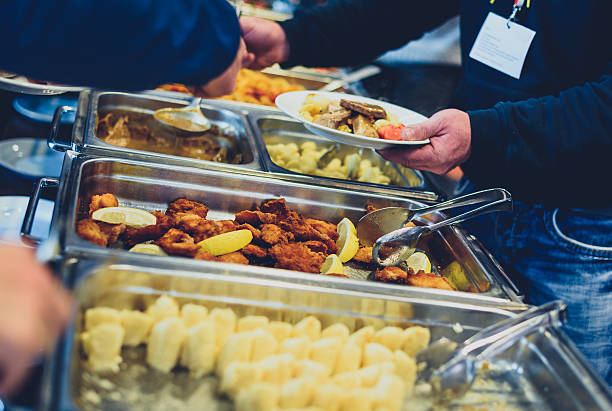Amid the fears and uncertainties of the pandemic, the beloved buffet concept took a massive blow. Shared serving spoons and communal dining seemed incompatible with the new normal of social distancing and hygiene protocols. However, against all odds, the all-you-can-eat buffet, an emblem of America’s love for choice and indulgence, is making a triumphant return.
A Value Proposition in Inflationary Times
The resurgence of chain-restaurant buffets, particularly in a time of rising inflation, can be seen as a value proposition. Golden Corral, with its 396 locations offering over 150 dishes for less than $20, has experienced a remarkable 20% increase in business this year. While affordable buffets cater to those on a budget, high-end spreads in Las Vegas continue to attract customers willing to pay top dollar for an unparalleled dining experience.
Indulging in Excess
Americans’ affinity for grandiosity is a driving force behind the buffet’s enduring popularity. Allison Corona, a data analyst from Pittsburgh, shares, “Americans love big things. That’s it. We just love more.”
Buffets cater to the American diner’s desire for abundance and choice, allowing them to experience a momentary sense of opulence. These culinary extravaganzas also serve as culinary road maps for immigrants and provide a form of culinary tourism for those who haven’t traveled extensively.
The Temptation of Excess
Buffets tap into the inner desires of American diners who yearn to pile their plates high, despite attempts to rebrand the concept as “all you care to eat” instead of “all you can eat.” Lily Jan, a food and beverage management lecturer at Cornell University, describes it as the “Cheesecake Factory effect.” Americans seek consistency and want to ensure their dining choices are worth the price, all while making the experience memorable.
Reshaping the Buffet Landscape
The buffet landscape has undergone significant changes in recent years, with many underperforming establishments shuttering their doors. Middle-of-the-pack buffets that failed to offer exceptional value or a diverse culinary selection did not return post-pandemic. Fresh Acquisitions, the company behind Hometown Buffet and other chains, filed for bankruptcy in 2021 due to concerns about restaurants not reaching the 75% capacity required to turn a profit.
The Evolution of Las Vegas Buffets
The inexpensive Las Vegas buffet, which originated in the 1940s to keep gamblers in casinos, is nearing its final chapter. Of the 18 buffets once dotting the Strip, only eight remain today. However, demand for high-end buffets in Las Vegas remains strong. Bellagio recently reopened its signature buffet, offering 120 choices for dinner, while Bacchanal at Caesars Palace underwent a $10 million renovation and expanded its brunch schedule.
The Buffet Reinvented
Buffet managers, both grand and modest, are reevaluating their food costs and finding ways to minimize waste—a long-standing issue associated with buffets. Individual portion plating, offering small bites and single servings, is becoming a common strategy. Improved kitchen efficiency and technology help chefs track customer consumption accurately. Additionally, surplus food that hasn’t been served is donated to food banks, reducing waste and benefiting the community.
A Post-Pandemic Shift
The pandemic forced buffets to adapt and improve their operations. Multimillion-dollar renovations and increased focus on hygiene measures, such as hand sanitizer stations, have instilled a sense of reassurance among diners. The buffet experience now aligns with customers’ heightened concerns about food safety and personal health. As Djuana Jordan, a diner at Golden Corral, states, “It’s sort of a step forward for us post-Covid.”
Buffets for Nostalgia and Community
For Gen Xers and older millennials, buffets evoke nostalgia from their youth, harking back to the golden age of Chinese buffets and national chains like Sizzler and Pizza Hut. Choo Choo Hu, a professional pianist in Atlanta, recalls her favorite dishes from the Old Country Buffet in St. Louis and how it made her feel uniquely American. Buffets also hold great significance in smaller cities and towns, where they serve as communal gathering places, fostering a sense of community along with their endless offerings of comfort food.
The Irresistible Power of Buffets
The pandemic may have disrupted the buffet landscape, but it did not extinguish its allure. Lori Ford, whose family founded The Movie Star Restaurant in Hattiesburg, Mississippi, remarks, “The pandemic didn’t kill the buffet; it just made it stronger.” Buffets have an uncanny ability to cater to people’s insatiable appetites and desire for autonomy in their dining choices.
Buffets have defied the odds and reemerged as a popular dining option, offering both value and a unique experience.
Watch this group of diners eat 300 crabs in a buffet:
